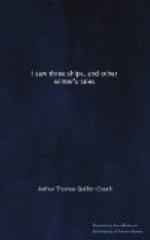“Hey,” murmured Elias, the bachelor; “but it must daunt a man to hear his name loudly coupled wi’ a woman’s before a congregation o’ folks.”
“’Tis very intimate,” assented Old Zeb. But here the First Lesson ended. There was a scraping of feet, then a clearing of throats, and the musicians plunged into “O, all ye works of the Lord.”
Young Zeb, amid the moaning of the storm outside the building and the scraping and zooming of the instruments, string and reed, around him, felt his head spin; but whether from the lozenge (that had suffered from the companionship of a twist of tobacco in Elias Sweetland’s pocket), or the dancing last night, or the turbulence of his present emotions, he could not determine. Year in and year out, grey morning or white, a gloom rested always on the singers’ gallery, cast by the tower upon the south side, that stood apart from the main building, connected only by the porch roof, as by an isthmus. And upon eyes used to this comparative obscurity the nave produced the effect of a bright parterre of flowers, especially in those days when all the women wore scarlet cloaks, to scare the French if they should invade. Zeb’s gaze, amid the turmoil of sound, hovered around one such cloak, rested on a slim back resolutely turned to him, and a jealous bonnet, wandered to the bald scalp of Farmer Tresidder beside it, returned to Calvin Qke’s sawing elbow and the long neck of Elias Sweetland bulging with the fortissimo of “O ye winds of God,” then fluttered back to the red cloak.
These vagaries were arrested by three words from the mouth of Old Zeb, screwed sideways over his fiddle.
“Time—ye sawny!”
Young Zeb started, puffed out his cheeks, and blew a shriller note. During the rest of the canticle his eyes were glued to the score, and seemed on the point of leaving their sockets with the vigour of the performance.
“Sooner thee’st married the better for us, my son,” commented his father at the close; “else farewell to psa’mody!”
But Young Zeb did not reply. In fact, what remained of the peppermint lozenge had somehow jolted into his windpipe, and kept him occupied with the earlier symptoms of strangulation.
His facial contortions, though of the liveliest, were unaccompanied by sound, and, therefore, unheeded. The crowder, with his eyes contemplatively fastened on the capital of a distant pillar, was pursuing a train of reflection upon Church music; and the others regarded the crowder.
“Now supposin’, friends, as I’d a-fashioned the wondrous words o’ the ditty we’ve just polished off; an’ supposin’ a friend o’ mine, same as Uncle Issy might he, had a-dropped in, in passin’, an’ heard me read the same. ‘Hullo!’ he’d ’a said, ‘You’ve a-put the same words twice over.’ ‘How’s that?’ ‘How’s that? Why, here’s O ye Whales (pointin’ wi’ his finger), an’ lo! again, O ye Wells.’ ‘’T’aint the same,’ I’d ha’ said. ‘Well,’ says Uncle Issy, ’’tis spoke so, anyways’—”




